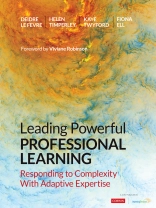Effective facilitation is complex
What is central to leading powerful and effective facilitation in professional learning? You. Gone are the one-size-fits-all answers—instead, you’ll draw from your own knowledge and expertise to lead your PLC in actively solving complex problems that are unique to your context.
For professional learning to have an improvement impact for both teachers and students, it needs to be more than a single event. Truly successful professional learning is sustained, collaborative, evidence-informed, and student-focused—generating multifaceted solutions to real-life, real-time issues rather than focusing on one piece of the practice puzzle at a time.
This book, based on the results of a five-year research study, provides:
• An innovative approach to the design and delivery of professional learning grounded in principles of adaptive expertise
• Easy-to-use one-page summaries of ‘Deliberate Acts of Facilitation’
• Guidance that’s fully congruent with Learning Forward Standards for Professional Learning
The current educational landscape demands a new kind of leadership. This book gives you the tools you need to apply the principles of adaptive expertise to your leadership and facilitation—enabling you to draw on your own deep knowledge to address the complex challenges you and your teachers face every day.
Inhoudsopgave
Foreword
Preface
Acknowledgments
About the Authors
Introduction
Chapter 1: The Roots
Root #1: Adopting an Evaluative Inquiry Stance
Root #2: Valuing and Using Deep Conceptual Knowledge
Root #3: Being Agentic
Root #4: Being Aware of Cultural Positioning
Root #5: Being Metacognitive
Root #6: Bringing a Systemic Focus
Chapter 2: The Trunk
Exercise #1: Trunk: Responsiveness through Relationships with a Generative Improvement Orientation
Chapter 3: Branches and Leaves
Branch 1: Purpose and Focus
DAF #1: Clarifying Purpose
DAF #2: Focusing on Valued Student Outcomes
DAF #3: Building Coherence
DAF #4: Creating Commitment and Taking Action
Branch 2: Knowledge and Inquiry
DAF #5: Deepening Knowledge
DAF #6: Using Evidence Critically
DAF #7: Using Focused and Deep Collaborative Inquiry
Branch 3: Effective Learning Processes
DAF #8: Surfacing and Engaging Theories and Beliefs
DAF #9: Navigating Perceptions of Risk
DAF #10: Developing Self-Regulation
DAF #11: Providing Appropriate Support and Challenge
DAF #12: Co-constructing Learning
Chapter 4: Facilitating Improvement
Facilitating Improvement and Adaptive Expertise
How Does Adaptive Expertise Fit With Other Forms of Expertise?
Developing Your Own Adaptive Expertise
Developing Adaptive Expertise in Others
Putting It All Together
Research Appendix
References
Over de auteur
Dr. Fiona Ell is an Associate Professor and Head of Teacher Education at the University of Auckland. She has a background in elementary teaching and remains a registered teacher. Fiona’s research centers on mathematics education and teacher professional learning, both before certification and afterwards. She has worked in Australia and New Zealand on schooling improvement projects, helping schools use the Spiral of Inquiry to improve the learning and wellbeing of their students. Fiona is interested in how teachers learn about the impact of their practice from considering the responses of their learners, especially when they work with marginalized communities. ?












